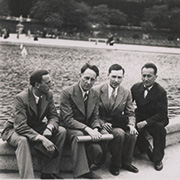Amongst the sumptuous riches of Bohuslav Martinů’s ingenuity, there are original chamber music works for larger forces. A new volume in the Complete Edition now makes these available.
Volume No. IV/4/1 of the Bohuslav Martinů Complete Edition comprises chamber music compositions for mixed wind and string ensembles. With the exception of one of the works (Nonet No. 2, H 374), the combinations are unusual – the septet Les Rondes, H 200, is written for oboe, clarinet, bassoon, trumpet, two violins and piano; Serenade No. 1, H 217, is for clarinet, horn, three violins and viola; Serenade No. 3, H 218, is for oboe, clarinet, four violins and cello; the nonet Stowe Pastorals, H 335, is for five recorders, two violins, clarinet and cello. These uncommon instrumentations are in line with Bohuslav Martinů’s other chamber works, especially in his Paris works from the 1920s to 1930s, which are notable for their experimentation in both sound and form. The compositions originated between 1930 and 1959, thus encompassing some of Bohuslav Martinů’s creative periods.
Les Rondes
The septet Les Rondes, H 200, was completed by Bohuslav Martinů on 23 November 1930 in Paris. The work comprises six parts, which Martinů repeatedly called dances. The composer alternately described the piece as Moravian or Czech dances because it was inspired by folk tunes and rhythms. This is the first work of the composer’s mature creative period that makes such extensive and ingenious use of the melodic, harmonic, and rhythmic elements of folk music. The premiere of Les Rondes took place on 18 March 1932 at a concert at École Normale de la Musique in Paris under the direction of Alfred Cortot. The work was published in 1950 by the Prague publisher Orbis.
Serenades Nos. 1 and 3
Martinů composed a cycle of four serenades in Paris in 1932. The title page of the autograph of Serenade No. 4 includes the author’s dedication “ À la Société d’études Mozartiennes de Paris” However, we do not have any documents that indicate that this society ever performed the works. The premiere is generally considered to have taken place on 16 October 1947 presented by members of the FOK orchestra, as is noted by Harry Halbreich. Unfortunately, neither the programme nor any reviews or other sources pertaining to this concert have been preserved. The Serenades were published by the Prague publishing house Melantrich in 1949.
Stowe Pastorals
The Stowe Pastorals, H 335, were composed by Martinů in New York in November 1951, and their original inspiration is connected with The Trapp Family. Their unusual instrumentation was clearly derived from the options and instruments of the ensemble. The Trapp Family Singers was a family ensemble that focused on the interpretation of folk music and music of the seventeenth and eighteenth centuries. The group was led by Maria von Trapp, founder and artistic director of The Trapp Family together with Franz Wasner. In 1938 the family immigrated to America and settled down in the town of Stowe. The family was made famous by the 1966 Academy Award-winning film The Sound of Music. The premiere of the Stowe Pastorals was aired on 7 May 1952 on Radio Basel as part of the celebrations of the 25th anniversary of the foundation of the local branch of the International Society for Contemporary Music (ISCM). The work was published in 1960 under the more concise name Pastorals. The current edition returns to the complete original title of Stowe Pastorals, which refers both to the place and persons that inspired the composer to create the piece.
Nonet No. 2
Nonet No. 2 for flute, oboe, clarinet, bassoon, horn, violin, viola, violoncello and double bass was commissioned by the Czech Nonet, whose director, violinist Emil Leichner, had asked Bohuslav Martinů for a composition for the ensemble’s 35th anniversary. Martinů accepted the commission, and his pledge caused a considerable stir both in Czechoslovakia and abroad. He worked on the piece in January and February 1959. The full public premiere took place at the festival in Salzburger Festspiele on 27 July 1959. A pocket edition of the composition was published in autumn 1959 by the Prague publishing house SNKLHU.
Jitka Zichová
(from [ta]kte 1/2016)



